It is so important to help your children with their language skills throughout their schooling, whether they are just starting school, or entering middle years. When children begin school their language still continues to develop and the stronger their language skills are, the better they will progress, especially with subjects such as reading, writing and spelling.
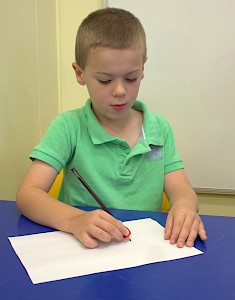
Children between the ages of five and seven have developed the basics of speech and language, however their communication skills will continue to develop. Vocabulary will continue to develop and grow throughout life and children beginning school learn lots of new words. Children will also learn new concepts and develop their ability to listen to, remember and understand more complex information. Basic grammar is acquired in the first five years, however older children will learn to understand and use more complex sentences and link sentences together in more complex ways, like in stories.
There’s lots to learn! The things that parents do at home are vitally important to a child’s development.
1. Read to your child: Children can’t read at the level of their understanding until around 10 years of age, so consider reading more complex books than they can read themselves. Don’t stop reading to your children just because they can now read themselves. Consider asking your local library staff to recommend books your child may enjoy. Well written children’s stories and novels are fun to read for adults too. Kids love funny stories such as those by Roald Dahl, Paul Jennings and Morris Gleitzman and fantasy such as by Emily Rhodda. Why not share a book you also loved as a child?
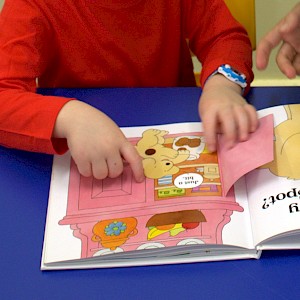
2. Show interest in your child’s learning: Talk to your child about what they learn each day. Look at the things they make and talk about them together. Put your child’s work on display and encourage them to show it to others. Your interest tells your child their learning is important and explaining information to another person helps with recall and understanding.
3. Build on what your child is learning at school. Classrooms often have theme based lessons, consider asking your child’s teacher what your child is learning about and extend this. For example, if your child is learning about dinosaurs you could borrow some dinosaur books, find some dinosaur websites or go the museum and see some real dinosaur bones.
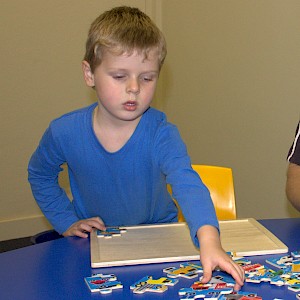
4. Connect language to your daily activities. Use the opportunity of completing activities at home to develop your child’s language skills. For example, when baking you could read a recipe together and talk about the ingredients or words your child might not be familiar with to develop their vocabulary. This would also provide an opportunity to write a shopping list together to develop literacy skills, look, touch, taste and talk about the ingredients to develop concepts and descriptive language and follow the steps to make the cake to develop procedural (steps in a sequence) language.
5. Model a range of language: Allow your child to see you using language in a range of ways and involve your child when you can. Let your child see you opening mail, paying bills, filling in forms, writing cards and invitations, reading the newspaper, books, newsletters and magazines, searching for information on line, using recipes, instructions and maps. One of the key language skills of school is to understand the structure of different types of texts and how to make them. Texts are larger units of language such as procedures, stories, and recounts. Building these into your daily life is a great way to help kids learn how they work. For more ideas on texts for school kids click here.
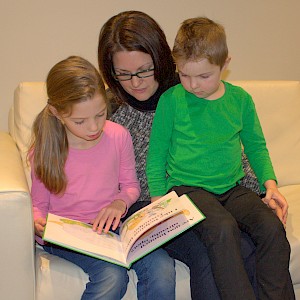
6. Play language and listening games together: Play imaginative games such as “eye spy” and “I went shopping and I bought…..”. Make cards with your child’s sight words on them and use them to play matching and memory games. Another great language activity are barrier games. You can find out how to use them here. Here are some more language games to develop descriptive language
7. Use technology to make your own language activities. Kids love things that are about themselves. Use a digital camera to make your own books, card games and power point displays. Take a series photos of your child doing something interesting and help your child add words to make a book or power point about what they did. You can do this using daily activities, outings or craft or cooking activities. Make a book to keep about something special such as a birthday party or school concert.
Above all, remember to keep things fun and positive. This will help to make it feel like a special sharing time together, not like hard work. Introduce new words and ideas gradually and repeat them lots of times. Model the correct way of doing or saying things if your child makes a mistake but be encouraging so they keep on trying and learning.
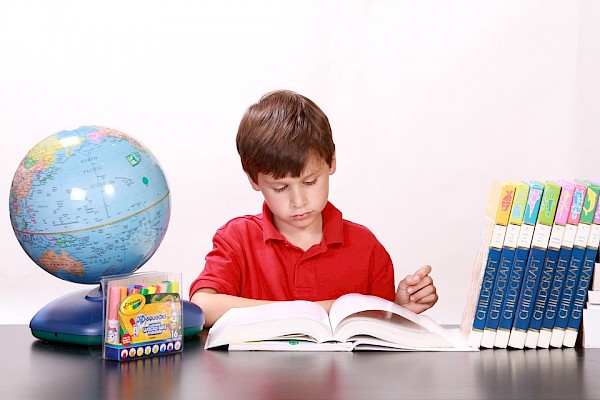
Developing your child’s language skills will prepare them well for learning at school and also help them develop a lifelong love of language and learning.
If you are concerned about your child’s development including speech, language, play skills, social communication skills, social skills or learning check our website to see how Talking Matters may be able to help. For more ideas and resources check the resources section on our website and our extensive Pinterest page. Like us on Facebook and follow us on Twitter so you don’t miss out on what’s happening.
If you are concerned about your child’s skills Talking Matters provides speech pathology and occupational therapy. To find out more about Talking Matters and our services and resources check our website or call our office on (08) 8255 7137.
If you are a professional looking to work with children in an exciting, fast paced setting with a dynamic multi-disciplinary team follow us on LinkedIn to find out about our team and any opportunities available.
Related Blog Posts
If you liked this post you may also like:
Now let's play
Christmas activities
10 more ways to pretend
Developing concepts



